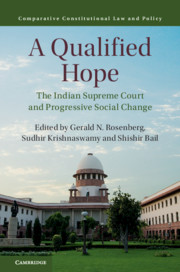19 results
Contents
-
- Book:
- A Qualified Hope
- Published online:
- 19 August 2019
- Print publication:
- 29 August 2019, pp vii-viii
-
- Chapter
- Export citation
Introduction
-
-
- Book:
- A Qualified Hope
- Published online:
- 19 August 2019
- Print publication:
- 29 August 2019, pp 1-20
-
- Chapter
- Export citation
Foreword
-
- Book:
- A Qualified Hope
- Published online:
- 19 August 2019
- Print publication:
- 29 August 2019, pp xv-xvi
-
- Chapter
- Export citation
Acknowledgments
-
- Book:
- A Qualified Hope
- Published online:
- 19 August 2019
- Print publication:
- 29 August 2019, pp xvii-xviii
-
- Chapter
- Export citation
Part IV - Discrimination
-
- Book:
- A Qualified Hope
- Published online:
- 19 August 2019
- Print publication:
- 29 August 2019, pp 293-344
-
- Chapter
- Export citation
Notes on Contributors
-
- Book:
- A Qualified Hope
- Published online:
- 19 August 2019
- Print publication:
- 29 August 2019, pp ix-xiv
-
- Chapter
- Export citation
Part II - The Supreme Court of India, Social and Political Mobilization
-
- Book:
- A Qualified Hope
- Published online:
- 19 August 2019
- Print publication:
- 29 August 2019, pp 149-240
-
- Chapter
- Export citation
Conclusion
-
-
- Book:
- A Qualified Hope
- Published online:
- 19 August 2019
- Print publication:
- 29 August 2019, pp 345-358
-
- Chapter
- Export citation
Part I - The Supreme Court of India – An Institutional Overview
-
- Book:
- A Qualified Hope
- Published online:
- 19 August 2019
- Print publication:
- 29 August 2019, pp 21-148
-
- Chapter
- Export citation
Copyright page
-
- Book:
- A Qualified Hope
- Published online:
- 19 August 2019
- Print publication:
- 29 August 2019, pp vi-vi
-
- Chapter
- Export citation
Part III - Welfare Rights and the Environment
-
- Book:
- A Qualified Hope
- Published online:
- 19 August 2019
- Print publication:
- 29 August 2019, pp 241-292
-
- Chapter
- Export citation
Appendix 2 - Model Diagnostics and Robustness Checks
- from 5 - Public Trust in the Indian Judiciary
-
- Book:
- A Qualified Hope
- Published online:
- 19 August 2019
- Print publication:
- 29 August 2019, pp 144-148
-
- Chapter
- Export citation
Appendix 1 - Variable Description, Codes and Summary Statistics
- from 5 - Public Trust in the Indian Judiciary
-
- Book:
- A Qualified Hope
- Published online:
- 19 August 2019
- Print publication:
- 29 August 2019, pp 141-143
-
- Chapter
- Export citation

A Qualified Hope
- The Indian Supreme Court and Progressive Social Change
-
- Published online:
- 19 August 2019
- Print publication:
- 29 August 2019
Contributors
-
-
- Book:
- The Cambridge Dictionary of Philosophy
- Published online:
- 05 August 2015
- Print publication:
- 27 April 2015, pp ix-xxx
-
- Chapter
- Export citation
Judicial Independence and the Reality of Political Power
-
- Journal:
- The Review of Politics / Volume 54 / Issue 3 / Summer 1992
- Published online by Cambridge University Press:
- 05 August 2009, pp. 369-398
-
- Article
- Export citation
Positivism, Interpretivism, and the Study of Law
-
- Journal:
- Law & Social Inquiry / Volume 21 / Issue 2 / Spring 1996
- Published online by Cambridge University Press:
- 27 December 2018, pp. 435-455
- Print publication:
- Spring 1996
-
- Article
- Export citation
The Supreme Court and Legal Change: Abortion and the Death Penalty. By Lee Epstein and Joseph F. Kobylka. Chapel Hill: University of North Carolina Press, 1992. 417p. $45.00 cloth, $16.95 paper.
-
- Journal:
- American Political Science Review / Volume 87 / Issue 4 / December 1993
- Published online by Cambridge University Press:
- 02 September 2013, pp. 1024-1025
- Print publication:
- December 1993
-
- Article
- Export citation
Hollow Hopes and Other Aspirations: A Reply to Feeley and McCann
-
- Journal:
- Law & Social Inquiry / Volume 17 / Issue 4 / Fall 1992
- Published online by Cambridge University Press:
- 27 December 2018, pp. 761-778
- Print publication:
- Fall 1992
-
- Article
- Export citation



